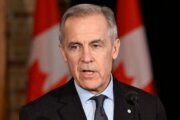WASHINGTON — Robin Williams was 63 years old when he died, and that makes this beloved comedian part of a disturbing national trend.
It used to be the age group most likely to commit suicide was teenagers and 20-somethings. But in recent years there has been a shift. In May 2013, the Centers for Disease Control and Prevention reported a huge increase in the suicide rate among Americans between the ages of 35 and 65.
Suicides in that age bracket went up 28.4 percent between 1999 and 2010, and most of the increase was among middle-aged men.
No one is sure exactly why, because the trend is so new, says Dr. Jay Singh, a mental health expert and CEO of the Global Institute of Forensic Research. A lot more study is needed.
Singh says a lack of research money for mental-health issues is a big obstacle to understanding the factors at play.
“We in the behavioral sciences have a very hard time now when it comes to obtaining research funding,” he says, adding, “these are typically federal grants, and there is not a lot of federal grant money out there right now.”
Singh says researchers do know that there is a distinct difference in the suicide patterns of middle-aged men and women. Women tend to choose methods that can be reversed, such as taking pills. Men, on the other hand, usually opt for more lethal means and have a much higher suicide completion rate.
Also, women are more likely to seek medical help, and Singh says the reluctance of many men to see a doctor could be one of several contributing factors in their high death rate.
He says some people refuse to seek care because they feel a stigma attached to mental health issues. Too many people suffering from depression consider seeking help to be a sign of weakness, he says, when they should consider it “one of the bravest and most courageous things [they] can do.”
And while there is always the concern that news of the suicide of a celebrity could lead to copycats, Singh says Williams’ death may just be a wakeup call.
“The really big message here is to be able to start focusing on mental illness not so much as some sort of weakness, but as a biological condition similar to cancer.”
He adds that the conversation must not end when the news coverage of this celebrity death fades away.
“My sincere hope is that really in a case like this — a man who meant so much to so many people around the world — that not only can we start saying that this is a major public health problem, but there are evidence-based ways of being able to help these individuals.”
He pauses for a moment.
“Let’s really get in there and do what we can.”
Follow @WTOP and @WTOPliving on Twitter and WTOP on Facebook.







